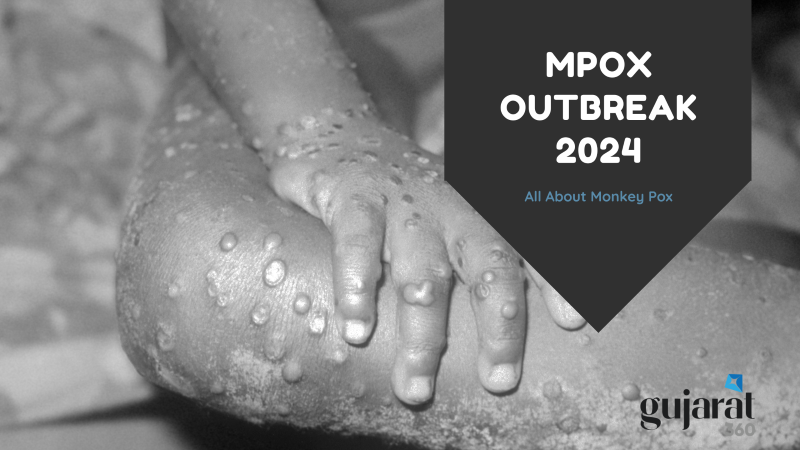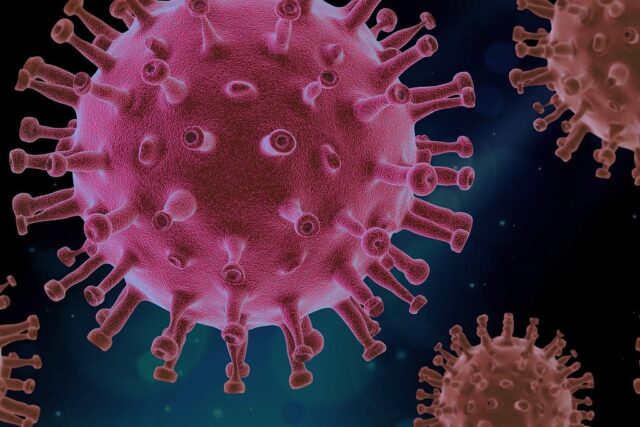India Prepares for Mpox Outbreak: Comprehensive Measures by Health Ministry and Gujarat’s Readiness

As global concerns over Mpox (formerly known as monkeypox) continue to rise, India has stepped up its efforts to prevent a widespread outbreak within its borders. With the World Health Organization (WHO) issuing warnings and guidelines, the Indian Health Ministry has taken proactive steps to ensure the country is prepared to handle any potential crisis. This blog explores the recent Mpox outbreak, WHO’s statements, India’s preparedness, and Gujarat’s specific measures to combat the virus. Additionally, it delves into the symptoms, treatment options, and safety measures essential for preventing the spread of Mpox.
The Recent Mpox Outbreak: A Global Concern
Mpox, a viral disease closely related to smallpox, has been relatively rare in humans, with most cases reported in Central and West Africa. However, in recent years, there has been an alarming increase in cases outside of these regions, leading to global concern. The 2022 outbreak was particularly significant, with cases reported in over 80 countries, many of which had never previously seen the virus.
The WHO has declared the Mpox outbreak a Public Health Emergency of International Concern, emphasizing the need for global cooperation and vigilance. The organization has also provided detailed guidelines for countries to detect, manage, and prevent the spread of Mpox. The virus primarily spreads through close contact with infected individuals or animals, and it can also be transmitted via contaminated materials.
WHO’s Statements and Global Response
The WHO has been at the forefront of the global response to Mpox. In its statements, the organization has highlighted the importance of early detection and isolation of cases to prevent further transmission. WHO Director-General Dr. Tedros Adhanom Ghebreyesus has urged countries to strengthen their surveillance systems and ensure that healthcare workers are well-equipped to handle Mpox cases.
The WHO has also emphasized the need for equitable access to vaccines and treatments, particularly in regions where the virus is endemic. The organization is working with governments, health organizations, and the private sector to ramp up production and distribution of vaccines like JYNNEOS, which has shown effectiveness against Mpox.
India’s Preparedness: A Coordinated Effort
India, with its vast population and diverse geography, faces unique challenges in managing potential outbreaks of infectious diseases. However, the country’s health infrastructure has been significantly strengthened in recent years, particularly in response to the COVID-19 pandemic. The Health Ministry’s recent actions to prepare for a potential Mpox outbreak reflect a coordinated and comprehensive approach.
Guidelines for Airports and Hospitals
One of the key components of India’s preparedness strategy is the issuance of detailed guidelines for airports and hospitals. These guidelines are designed to detect and manage Mpox cases at the earliest possible stage. At airports, thermal screening of passengers from affected regions has been intensified, and isolation facilities have been set up to handle suspected cases.
Hospitals across the country have been instructed to establish dedicated isolation wards for Mpox patients. The Health Ministry has also provided training for healthcare workers on the proper use of personal protective equipment (PPE) and the management of Mpox cases. These measures are crucial for preventing the spread of the virus within healthcare settings, where the risk of transmission is particularly high.
Vaccination and Treatment
In line with WHO recommendations, India is also exploring the use of vaccines and antiviral treatments to combat Mpox. The country has secured doses of the JYNNEOS vaccine, which is being administered to high-risk groups, including healthcare workers and individuals who have been in close contact with confirmed cases.
The Health Ministry is working closely with pharmaceutical companies and research institutions to ensure that treatments like tecovirimat (TPOXX) are available for those who need them. Additionally, the government is collaborating with international partners to facilitate the import and distribution of these critical medical supplies.
Gujarat’s Preparedness: A Regional Focus
As one of India’s most industrialized states with a significant international presence, Gujarat has taken proactive steps to ensure its readiness for a potential Mpox outbreak. The state government has implemented several measures in line with national guidelines, while also tailoring its approach to the specific needs of the region.
Strengthening Surveillance and Healthcare Infrastructure
Gujarat’s Health Department has ramped up surveillance efforts, particularly in areas with high international travel and trade. The state’s airports and seaports are conducting enhanced screening for passengers arriving from regions affected by Mpox. Additionally, the government has set up rapid response teams to quickly investigate and respond to any suspected cases.
Hospitals in Gujarat have been instructed to prepare for a possible influx of Mpox patients. Isolation wards have been established in major healthcare facilities, and training sessions have been conducted for healthcare workers on the management of Mpox cases. The state government is also working to ensure that sufficient stocks of vaccines, PPE, and antiviral medications are available.
Public Awareness and Community Engagement
Public awareness campaigns are a key component of Gujarat’s preparedness strategy. The state government has launched initiatives to educate the public about Mpox, including its symptoms, modes of transmission, and preventive measures. These campaigns are being conducted through various channels, including social media, print media, and community outreach programs.
Community engagement is also crucial in preventing the spread of Mpox. The government is working with local leaders, NGOs, and religious organizations to promote awareness and encourage people to report any suspected cases. This grassroots approach is essential for reaching remote and underserved areas, where the risk of undetected transmission may be higher.
Mpox Symptoms, Treatment, and Safety Measures
Understanding the symptoms, treatment options, and safety measures for Mpox is crucial for preventing its spread and ensuring prompt medical intervention.
Symptoms of Mpox
Mpox typically begins with flu-like symptoms, including fever, headache, muscle aches, backache, swollen lymph nodes, chills, and exhaustion. Within a few days, a rash develops, usually starting on the face and then spreading to other parts of the body, including the palms of the hands and soles of the feet. The rash goes through several stages, from macules to papules, vesicles, pustules, and finally scabs. The lesions can be painful, and the illness generally lasts 2 to 4 weeks.
Treatment for Mpox
There is no specific treatment for Mpox, but the disease is usually self-limiting, with most patients recovering within a few weeks. Supportive care is the primary treatment approach, focusing on managing symptoms and preventing complications. In severe cases, antiviral medications like tecovirimat (TPOXX) may be used, particularly in immunocompromised patients or those with severe disease.
Safety Measures to Prevent Mpox Spread
Preventing the spread of Mpox requires a combination of public health measures and individual actions. Key safety measures include:
- Isolation of Infected Individuals: Suspected and confirmed Mpox patients should be isolated to prevent transmission to others. This includes both home isolation for mild cases and hospital isolation for severe cases.
- Use of Personal Protective Equipment (PPE): Healthcare workers and caregivers should use appropriate PPE, including gloves, masks, and gowns, when caring for Mpox patients.
- Vaccination: High-risk groups, including healthcare workers and close contacts of confirmed cases, should be vaccinated against Mpox.
- Hygiene Practices: Regular handwashing with soap and water, avoiding contact with infected animals, and not sharing personal items with others are essential hygiene practices to prevent Mpox transmission.
- Public Awareness: Educating the public about the symptoms, transmission, and prevention of Mpox is critical for early detection and response.
Be safe during the Mpox Pandemic Outburst
As the world grapples with the ongoing Mpox outbreak, India and Gujarat have demonstrated a strong commitment to preparedness and response. Through a combination of surveillance, vaccination, public awareness, and healthcare readiness, the country is well-equipped to handle a potential outbreak. However, continued vigilance, international cooperation, and adherence to public health guidelines will be essential to prevent the spread of Mpox and protect public health.







